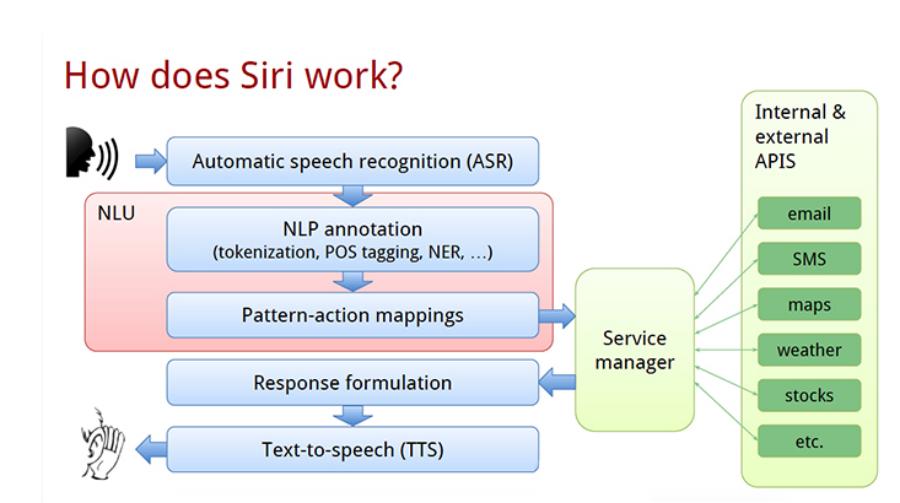Theoretical explanation of how Siri works
Everyone is familiar with this term Siri, since the Apple market is growing and those who, no matter purchased or not, know that it is a well-recognized term. For those who have just heard the word Siri – “It is a voice assistant whose working is based on the principle of Artificial Intelligence, way advanced than Microsoft’s Word’s assistant (wasn’t an AI) back in the 1990s”. It is just a “drop in an ocean” if you try to know more how much progress we have made yet and what are the future plans of those lab geeks!
Siri was just a fraction of the U.S. project CALO (Cognitive Assistant that Learns and Organizes), a subset of DARPA (that was aimed at building a virtual assistant in order to help communicate the military commanders in 2003, developed by 500 persons, lasted for 5 years), that was launched by three scientists, as a standalone application in 2010, which was later bought by Apple. They intend to develop a Bot which would observe the surroundings and ‘learn’ whichever information is fed to them.
Currently it understands several languages like Italian, Cantonese, Swiss French, Spanish, Swiss German, Japanese, Mandarin, Chinese, Russian, Thai, Danish, Dutch, Swedish, Turkish, Portuguese, and English for India.
Machine Learning vs Artificial Intelligence
Even though these appear similar, these terms aren’t literally same, even these are related to each other. Artificial Intelligence is a branch of computer science that is particularly focused on the machine’s overall behavior (through learning) with negligible external interference through writing codes. The AI researchers need to build smart machines but in addition to that, they also require machine learning experts to get the desired outcomes of intellectual robots.
Google and Nvidia are currently working really hard in achieving that kind of success. The concept of machine learning has practically implemented in the form of speech recognition, Web search and self-driving cars. Everyone notices “Did you mean….?” if they type wrong phrases or words on the search bar. This is how the Google search engine ‘learns’. Once you type something, it remembers and relates the same phrase the next time someone else types and intends to search.
Similarly, the self-driving car remembers the hurdles that come in front of it, learns how to get rid of that hurdle and behaves exactly the same it did before as a successful attempt, hoping that it is the only way to move forward. If it finds out that the method applied previously won’t help, it will find another way out. This time it keeps two ways out just as conditional statements a programmer writes – If this, then do Step 1, else Step 2.
How does Siri work?
In order to form an AI code that resembles Siri, one needs to have a search engine, a Chatbot, a voice input API and Wolfram Alpha. If you are a real Tech geek and love coding, it won’t take more than a day (or even less!) for you to develop this. But to develop a full-fledge AI assistant, you need to understand the overall functioning. Yes, it is possible that you know coding but least aware of this field. If you are new to coding, you must give yourself some time to master in it then proceed for new possibilities of exploration.
1. Voice Recognition – Whenever a person commands through his/her natural voice, the assistant must be able to convert that analog signal to digital one and then ‘understand’ what was being said after concatenating the keywords altogether, and finally fixing/obeying the issue/command. This might sound trivial and easy but it is the first step towards reaching the next, since without overcoming the hurdle of country-wise accents, surrounding noises, and specific voices, one cannot successfully establish its working. It also timely learns how its user sounds while speaking specific words. The speech recognition that Apple’s Siri uses is 95% accurate and has really low error rate.
2. Send everything to the Cloud servers – Siri does not work locally on a mobile device and eats its limited resources, but rather loads everything to the powerful computer servers so as to extend the maximum efficiency and continuously improvise. There is an algorithm that identifies the keywords and go down towards the flowchart branches (conceptually Tree data structure) that best match those keywords, so as to reach out to meaningful conclusions. If it fails, it searches for another branch. If it fails here too, it asks whether the user wants results from the Web. It hasn’t reached to the point of conversational App but has numerous conditional statements in its coding that respond according to the user’s action. The latest one has some humorous responses as well, such as “be careful who you date today, or you could start disappearing from photos”.
3. Understand what the statement implies – If you ask Siri “Is there any nearby Italian restaurant?”, it will check for the same through GPS, but what if you said “I love Margherita”? Only a human is capable to understand that it is a type of Pizza, but an AI won’t get it. If a coder writes code of an Artificial Intelligence, he/she must know how sophisticated a machine ought to be. Also, it must be able to recognize the difference between words like – byte and bite, sheep and ship, dear and deer, etc. Siri is able to relate the words with each other in terms of nouns, adjectives, verbs, and sentence as a whole. For instance, if you say “How fast a deer can run?”, it will obviously match these words and conclude that it cannot be “dear”; likewise, if you say “I’ll bite you”, it will understand that there is no possibility that it is “byte”. There is nothing to get surprised by such statements. People play with something they find new and there is no wonder that they speak out loud ‘any’ random thought.
4. Action based on what was commanded – Here is the most challenging thing. Siri or any other AI assistant you plan to develop must understand what you say. If it fails it might also drag you to potential dangerous situation. For instance, if you said to book a flight, it must be capable to understand this and as well interact with other Apps to perform the given task. Plus it must not interact with those sites that aren’t your interest, especially those that involve credit/debit card payment. One might get doomed if the assistant doesn’t serve appropriately.
There are other voice assistants as well but they haven’t reached to the standard of accuracy Siri currently has, yet! The future might be offering us something better and technically sounder AI machines, and that does not imply that only Siri will be capable and others won’t be. It is the matter of time that is going to decide what would be leading the world.




